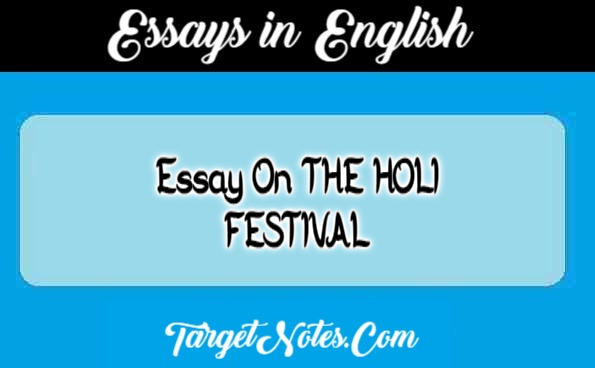
Essay On THE HOLI FESTIVAL
Introduction
The Holi festival is one of the most important and interesting festivals of the Hindus. It comes in the month of Fagun. All persons young and old, men and women, boys and girls look forward to this day with great joy.
The origion of the festival
There is a story about the origin of this festival. Prahlad was a devotee of Vishnu. His father Hirnakashyap, hated Vishnu. He wanted to punish his son for announcing the name of Vishnu. He tried many ways to kill him but all failed. Hirnakashyap was determined to kill him. In the end he asked his sister, Holika to enter the fire with Prahlad. Her body was fire proof. Fortunately, Prahlad came out of the fire safe but his aunt (Holika) was burnt to death. So this festival is celebrated in the honour of this event.
It is also said that the Holi is the beginning of the harvest season. The harvest is ready and the hearts of the farmers are full of joy. So new ears of corn are roasted on the Holi fire and dis tributed among friends and relation as Prasad with embraces.
How celebrated ?
On the festival night a huge fire is made. Heaps of wood, dung, thorns and other things are collected and burnt. Great preparations are made for this fire. Mischievous people carry away cots, furniture and thatches of other people and put them in the fire secretly. This is a very bad thing.
On the Holi day many kinds of sweets and other fine things are made by women in their houses. The most important thing is goonjha which is made even in the poorest family. Sweets are bought from the market also.
In the morning after the burning of the Holi people become wild with joy. They make coloured water and throw it on the passers-by by means of a syringe. People go to the houses of their friends and relations. Coloured powder is rubbed on the faces on this day. Everyone looks coloured and funny on this day. Some people go in parties to their friends and relations with music and singing on the way. They are given sweets and betels. Some give sweet Bhang sharbat. Some people throw mud and dirty water on one another. This is a very bad practice.
Conclusion
These things show that there is great joy on this festival. But it is not celebrated in a civilized way. People of other countries laugh at us for our foolish and wild manner. Now we are free. Let us behave like civilized people.
Vocabulary
Look forward- wait anxiously for, Devotee- follower or ardent believer, Ears- part of the ripe grain, बाबलियाँ। Embrace- to enclose in arms, गले मिलना। Passers by- one who goes on a path, Civilized-cultured, Syringes-a pipe to suck and eject water.
IMPORTANT LINK
- आदर्श इतिहास शिक्षक के गुण एंव समाज में भूमिका
- विभिन्न स्तरों पर इतिहास शिक्षण के उद्देश्य प्राथमिक, माध्यमिक तथा उच्चतर माध्यमिक स्तर
- इतिहास शिक्षण के उद्देश्य | माध्यमिक स्तर पर इतिहास शिक्षण के उद्देश्य | इतिहास शिक्षण के व्यवहारात्मक लाभ
- इतिहास शिक्षण में सहसम्बन्ध का क्या अर्थ है ? आप इतिहास शिक्षण का सह-सम्बन्ध अन्य विषयों से किस प्रकार स्थापित करेंगे ?
- इतिहास क्या है ? इतिहास की प्रकृति एवं क्षेत्र
- राष्ट्रीय उच्चतर शिक्षा अभियान के विषय में आप क्या जानते हैं ?
- शिक्षा के वैकल्पिक प्रयोग के सन्दर्भ में एस० एन० डी० टी० की भूमिका
- राष्ट्रीय पाठ्यचर्या की रूपरेखा (एन.सी.एफ.-2005) [National Curriculum Framework (NCF-2005) ]
Disclaimer






Holi festival note